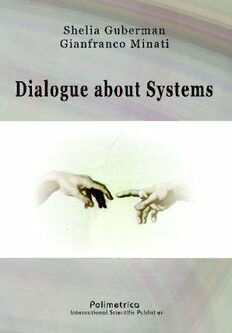
Dialogue about Systems PDF
215 Pages·2007·3.509 MB·English
Most books are stored in the elastic cloud where traffic is expensive. For this reason, we have a limit on daily download.
Preview Dialogue about Systems
Description:
The word system is widely used in everyday language with different meanings often making it difficult to understand what a system is and what it is not. The concept is apparently easy to understand and its usage is based on general intuition rather than on solid theory. This Dialogue is not for popularizing or introducing the concept. The Dialogue is about some current, crucial issues related to systems in science, such as emergence, self-organization, theoretical role of the observer, cognitive science, pattern recognition and image understanding. The general framework of the Dialogue relates to epistemological issues. The reader is invited to participate in the dialogue, that is to identify and elaborate his/her questions and answers in those of the authors. This Dialogue is a scientific adventure open, as always, to be read as a more general cultural one, by identifying, for instance, analogies, correspondences and metaphors. The Dialogue is also a good system of links to different disciplinary knowledge that the reader should know about if seriously interested in dealing with systems. Because the issue of systems is an inter-disciplinary one (i.e. when approaches of one discipline are used by another, such as models from Physics used in Economics and economic problems represented using physical models, such as using collective behaviour to model markets) the book per se is not recommended with reference to specific knowledge within various disciplines (e.g. Physics, Biology, Artificial Intelligence, Cognitive Sciences, Economics, Architecture and Music), but as a general methodological approach to modelling. This book is a tool for establishing serious educational programs in systems, a good complementary reader for researchers and a tool for clarifying what the theoretical usage of the concept of system may offer to science and culture.
See more
The list of books you might like
Most books are stored in the elastic cloud where traffic is expensive. For this reason, we have a limit on daily download.
